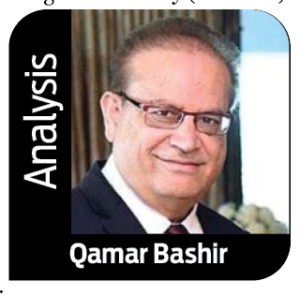 The Pakistan Sovereign Wealth Fund (PSWF) Bill was passed by the Senate on Wednesday, August 2, just eight days prior to the dissolution of the National Assembly and the end of the current government’s mandate. The bill, once signed by the President, will enable the government to establish a PSWF where the country’s solvent assets worth Rs. 2.3 Trillion will be parked. PSWF is being established to provide a long-term investment vehicle for the nation’s excess oil and gas revenues, invest in strategic assets such as infrastructure and energy initiatives, and provide financial assistance to the government.
The Pakistan Sovereign Wealth Fund (PSWF) Bill was passed by the Senate on Wednesday, August 2, just eight days prior to the dissolution of the National Assembly and the end of the current government’s mandate. The bill, once signed by the President, will enable the government to establish a PSWF where the country’s solvent assets worth Rs. 2.3 Trillion will be parked. PSWF is being established to provide a long-term investment vehicle for the nation’s excess oil and gas revenues, invest in strategic assets such as infrastructure and energy initiatives, and provide financial assistance to the government.
The government has identified at least seven solvent and profit making companies with net worth of Rs. 2.3 trillion including Oil and Gas Development Company Limited (OGDCL), Pakistan Petroleum Limited, National Bank of Pakistan, Pakistan Development Fund, Government Holdings Private Limited, Mari Petroleum Company Limited, and Neelum Jhelum Hydro Power Company Limited for their transfer to SWF.
The new sovereign fund is exempted from three core laws: the Privatisation Commission Ordinance, Public Procurement Regulatory Authority Ordinance, and the State-Owned Enterprises (SOE) Act, 2023. This, according to one opinion, clearly reflects the urgency on the part of the current government to allow the caretaker government to quickly sell some of the identified assets or use them to raise loans.
The Abu Dhabi Investment Authority (ADIA), worth $ 850 million, has provided technical assistance to Pakistan in the drafting of the law, which may end up buying or benefiting from this fund as the United Arab Emirates (UAE) has repeatedly expressed interest in acquiring stakes in Pakistan’s oil and gas sector, indicating the possibility of divesting shares of these assets. The crafting of such an important piece of legislation with the assistance of the law’s beneficiaries could be considered a conflict of interest. This is the same formula that was used while developing the mineral exploration policy, which acquired the input and agreement of prospective investors before it was finalised.
Interestingly, thanks to SIFC, Pakistan’s relations with the UAE have suddenly improved. The government has already sold four terminals 6 to 9 of the east wharf of the Karachi port to the UAE on the platform of SIFC, and SIFC is also pressuring the Ministry of Commerce to sign a Comprehensive Economic Partnership Act (CEPA) with the UAE before the end of the term, despite the opposition of the Pakistan Business Council, which claims that it will reduce 80% of tariff lines to zero duty in ten years, harming local manufacturing.
The IMF’s latest staff level report had recommended the governments to carefully consider the potential benefits and risks of the sale of state-owned assets before making a decision to sell and has advised it to adopt a transparent and fair process for making such deals and to ensure that the proceeds of the sale are used for productive purposes. However, the report also noted that the sale of state-owned assets has become increasingly common in recent years, as governments have sought to raise revenue and reduce debt, besides improving efficiency and transparency in the economy, and attracting foreign investment.
The finance ministry has already finalised the broad features of the Pakistan Sovereign Wealth Fund (PSWF), including its governance structure and transaction flow. The fund will, according to plans, optimally leverage and better manage the government’s assets in accordance with international standards, policies, and practises. The Fund will be able to make direct investments in existing and new projects, leverage existing assets, and invest in joint ventures with private parties, foreign sovereign wealth funds, and governments. The fund would have the legal status of a corporation, with the authority to raise funds through the sale of assets and to use Pakistan’s share in joint ventures in the agriculture, mining, and information technology industries.
The government is also forming a Supervisory Council, which will be led by the prime minister. Members will include the ministers of finance and planning, the finance secretary, the governor of the SBP, and the fund’s CEO. The transfer of state-owned firms to the sovereign fund will be decided by the supervisory council. A seven-member advisory committee comprised of seven experts, who may also be foreigners, and a seven-member board are being formed to oversee the new fund’s operations, with the mandate to approve the annual budget and profit distribution, attract investment and market the Fund, and develop financial, administrative, and investment policies.
Pakistan is not the only country that has established an SWF; in fact, it is too late. There are more than 60 sovereign wealth funds around the world, with a combined asset worth of more than $7 trillion. Norway, Saudi Arabia, and China have the largest SWFs. SWFs exist in developed countries such as the United States, Japan, and Germany.
However, the destiny of the bill hangs in the balance because it was enacted only 7 days before the dissolution of the legislatures and the end of the incumbent government’s term.
As per procedure, once the bill is passed by the Parliaments, the Speaker National Assembly or the Senate Chairman as the case may be sent the passed bill to the Prime Minister, who in his turn a bill vide his converting note or a summary advising the President to sign the bill. The president on its turn has 16 days to either sign the bill or send it back to the Prime Minister advising to reconsider the bill in the light of his observations. The bill is then submitted to the joint session of the parliament, if the parliament amend the bill or otherwise is sent back to the president who after receiving the bill has another 9 days to sign the bill or otherwise.
It means that all nine legislation passed after July 20th are at risk of lapse since, once the assemblies are dissolved and the bills are not yet signed by the president, the bill will either expire or be revived when the next parliament is elected.
In many nations, the bill will simply expire if it is not signed by the president before the end of the parliament’s term. If the bill dies, it must be reintroduced in the following parliament to become law. If the bill is resurrected, however, it will not have to go through the entire legislative process again. Instead, it will be forwarded to the president for signature. If a bill is not signed by the president within 10 days (excluding Sundays) in the United States, it becomes law without his signature. This is referred to as a “pocket veto.” A bill dies in Canada if it is not signed by the governor general within 30 days, and in Singapore if it is not signed by the president within 21 days.
I hope the President recognises the importance and urgency of the bill and considers signing it into law, as approval of the PSWF bill is a big step forward for the country. It would provide a much-needed source of long-term financing for investment in vital sectors such as infrastructure, energy, and manufacturing, hence stimulating economic growth and job creation.
The President may have all the more reasons to sign the bill as the entire international media has largely reacted positively to the passage of this bill.
Reuters said “The passage of the bill is a significant step forward for the government, as it will help to attract foreign investment and boost economic growth’ and added that the government has set a target of raising $10 billion from the sovereign wealth fund over the next five years.
Financial Times said: “The bill is seen as a key part of the government’s efforts to attract foreign investment and boost economic growth.” and added the bill was passed with the support of the opposition parties, which is seen as a sign of consensus on the need to reform the economy.
Bloomberg commented, “The bill is seen as a key part of the government’s efforts to reform the economy and address the country’s chronic balance of payments problems.” and added that the bill is seen as a key part of the government’s efforts to comply with the conditions of the International Monetary Fund (IMF).
The Wall Street Journal observed, “The bill is a welcome development, as it will help to improve the country’s investment climate and attract foreign capital” and added that the bill is a “test case” for the government’s ability to implement economic reforms.
The Economist commented, “The passage of the bill is a positive step, but it remains to be seen whether the government will be able to implement it effectively.” and added that the bill is “a step in the right direction,” but it warned that the government will need to “avoid the pitfalls of corruption and mismanagement.
The success of PSWF will however depend on how the incoming caretaker government treats this bill and on the political will of the next elected government which will come into power after securing a mandate by the people in the next general election, assuming that they will be held as per provisions of the constitution.
The success of PSWF will also depend on a number of factors, including the quality of its management, the performance of its investments, and the stability of the global economy It will also depend on providing it with adequate resources and by appointing experienced and qualified managers capable of developing a clear investment strategy, publish regular reports on the fund’s activities and ensuring that the fund is transparent and accountable.
The author is the former Press Secretary of the President of Pakistan, the former Press Minister of the Embassy of Pakistan in France and also has been the former MD / CEO Shalimar Recording and Broadcasting Company (SRBC)





